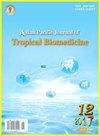淫羊藿苷加莪术醇可通过 mTOR 途径增强自噬作用,并促进 cathepsin B 介导的前列腺癌细胞的热解作用
IF 1.7
4区 医学
Q3 TROPICAL MEDICINE
引用次数: 0
摘要
为了研究冰片苷加姜黄醇对前列腺癌细胞 PC3 的影响并阐明其潜在机制。 我们采用了细胞计数试剂盒 8 检测法和集落形成检测法来评估细胞活力和增殖。自噬表达采用单丹参素染色法进行分析。免疫荧光和 Western 印迹分析用于评估与自噬、热昏迷和 mTOR 通路相关的蛋白质表达。乳酸脱氢酶测定法检测了细胞损伤。此外,还通过共免疫沉淀法检测了 cathepsin B 和 NLRP3。 淫羊藿苷和姜黄醇能减少 PC3 细胞的增殖,增强自噬作用。在使用冰片苷加姜黄酚处理后,LC3-II/LC3-I和beclin-1的水平升高,而p62和mTOR的水平降低。过表达 mTOR 后,这些变化被逆转。此外,与冰片苷加姜黄酚组相比,3-甲基腺嘌呤导致炎性细胞因子、热蛋白相关蛋白水平和乳酸脱氢酶浓度下降。抑制 cathepsin B 可逆转冰片苷加姜黄醇的调节作用。 这些发现为了解冰片苷和姜黄酚治疗前列腺癌的分子机制提供了宝贵的信息。本文章由计算机程序翻译,如有差异,请以英文原文为准。
Icariin plus curcumol enhances autophagy through the mTOR pathway and promotes cathepsin B-mediated pyroptosis of prostate cancer cells
To examine the effect of icariin plus curcumol on prostate cancer cells PC3 and elucidate the underlying mechanisms.
We employed the Cell Counting Kit 8 assay and colony formation assay to assess cell viability and proliferation. Autophagy expression was analyzed using monodansylcadaverine staining. Immunofluorescence and Western blot analyses were used to evaluate protein expressions related to autophagy, pyroptosis, and the mTOR pathway. Cellular damage was examined using the lactate dehydrogenase assay. Moreover, cathepsin B and NLRP3 were detected by co-immunoprecipitation.
Icariin plus curcumol led to a decrease in PC3 cell proliferation and an enhancement of autophagy. The levels of LC3-II/LC3-I and beclin-1 were increased, while the levels of p62 and mTOR were decreased after treatment with icariin plus curcumol. These changes were reversed upon overexpression of mTOR. Furthermore, 3-methyladenine resulted in a decrease in inflammatory cytokines, pyroptosis-related protein levels, and lactate dehydrogenase concentration, compared to the icariin plus curcumol group. Inhibiting cathepsin B reversed the regulatory effects of icariin plus curcumol.
Icariin plus curcumol demonstrates great potential as a therapeutic agent for castration-resistant prostate cancer by enhancing autophagy via the mTOR pathway and promoting pyroptosis mediated by cathepsin B. These findings provide valuable insights into the molecular mechanisms underlying the therapeutic potential of icariin and curcumol for prostate cancer treatment.
求助全文
通过发布文献求助,成功后即可免费获取论文全文。
去求助
来源期刊

Asian Pacific journal of tropical biomedicine
Biochemistry, Genetics and Molecular Biology-Biochemistry, Genetics and Molecular Biology (miscellaneous)
CiteScore
3.10
自引率
11.80%
发文量
2056
审稿时长
4 weeks
期刊介绍:
The journal will cover technical and clinical studies related to health, ethical and social issues in field of biology, bacteriology, biochemistry, biotechnology, cell biology, environmental biology, microbiology, medical microbiology, pharmacology, physiology, pathology, immunology, virology, toxicology, epidemiology, vaccinology, hematology, histopathology, cytology, genetics and tropical agriculture. Articles with clinical interest and implications will be given preference.
 求助内容:
求助内容: 应助结果提醒方式:
应助结果提醒方式:


